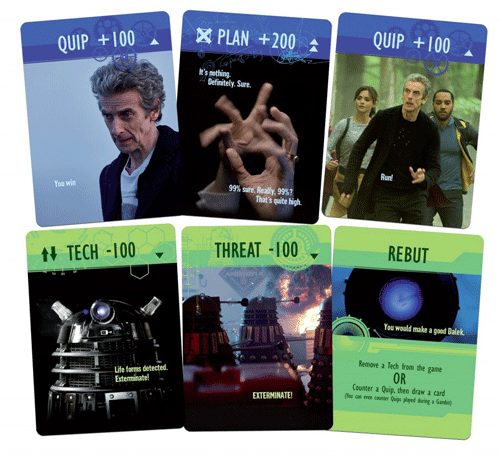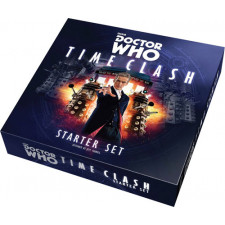Doctor Who: Time Clash - Starter Set Review
on Dec 6, 2016
I had a bad feeling about Cubicle 7’s Doctor Who: Time Clash for a number of reasons. One is that it has that rookie mistake where it has numbers 100, 200 300 and so on when 1, 2 and 3 would have been functionally the same. Another is that it had the look of a lazy IP-milking attempt full of stills and quotes from the most recent season of the show. And it is billed as a “starter†set, which often spells doom as the game either fades into obscurity or wallows in an endless stream of expansions. But I’m a helpless Whovian and it doesn’t take much more than a picture of a Dalek to get my attention so I failed my saving throw against merchandising.

The Doctor tries to mathematically work out why this design uses numbers in the 100s instead of single digit values.
The good news is that Time Clash is actually a pretty decent card game despite the Doctor Who setting having very little significance. It’s definitely geared more toward the mainstream fan market and less toward gaming enthusiasts, but there’s definitely something light and fun worth playing here even if it doesn’t really even try to offer a strong narrative or explore some of the themes of the very excellent television show.
Fundamentally, the design (by Jeff Tidball) is somewhat along the lines of a contested location card game such as Battle Line, where players place competing cards to claim superiority over a control point. The Doctor on one side and the Daleks on the other plays Tech, Quip and Plan cards of different values (in the hundreds for no reason) to three different Time Arcs, which form a circular play area. An example setup may have Time Arcs abstractly associated to Clara Oswald, Davros, and Skaro. These impact not only which suits of cards can be played, but also what game effects the Doctor has if his token is present in that Time Arc. This might be good or bad for either side- maybe the Doctor is shifting the balance for the good on Skaro or perhaps he’s tied up or captured there.
Unlike most games of this type, the cards are placed in a single stack with the sum value totaled to determine superiority. The Daleks play negative value cards and the goal for them is to get a threat value of -1000 in one arc and have a negative sum in the two other Time Arcs. But the Doctor wins a little differently. The player must have a positive value of 800 in at least one arc, and then a token is flipped to see if it triggers the endgame Gambit. Then, the top card of each stack may be selected to add (or subtract) to the a total value and a die is rolled. If the open cards and the dice equal at least 800, it’s another victory for the man from Gallifrey and his companions. If it fails, all of the cards applied are discarded and the game continues. It’s set up- rather smartly- such that the Daleks will win almost by default if a gambit doesn’t pay off. It’s a “best of three†thing so you’ve got to succeed at least twice to win it all.
There are some neat twists to all of this that add depth and some light- but impactful- decision points. Tech cards let you shift cards around in the stack while Plan cards allow you to take out a lower valued card. And both sides are completely asymmetrical with different approaches. The discard to move the Doctor is also a big choice because you might have to forgo a play to get him to a more advantageous position or to use a specific ability such as drawing extra cards.

In the 1960s, the Daleks terrified kids across the UK with their rebuttals.
There is also variety in the box with a couple of different Time Arcs, all 12th Doctor and Dalek themed. Future sets are reported to bring in Cybermen and The Master, as well as classic Doctors, companions, and other story elements. It supports two to four players, but past two and it becomes a team thing, which I’m generally not crazy about. There is also some goofiness with adjusting difficulties based on which Time Arcs you are using, which prevents any imbalances without changing the basic design but introducing a needless complication.
Honestly, I thought this game would be crap but I wound up liking it as much as I liked the Martin Wallace-designed Doctor Who Card Game, also done by Cubicle 7. Time Clash occupies a similar space. It’s a basic but absolutely good card game with IP dressing for fan appeal. It’s not Pax Renaissance or the second coming of Race for the Galaxy and it isn’t the definitive Doctor Who gaming experience (come on, Gale Force 9). But this Doctor Who fan would be more than happy to get this as a holiday present, let alone to play it with friends, family or other Whovians. And you know what; I’m on board for the expansions too.

 Customer Support
Customer Support  Subscribe
Subscribe 




 Account
Account  Wishlist
Wishlist 

